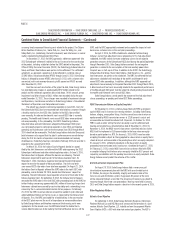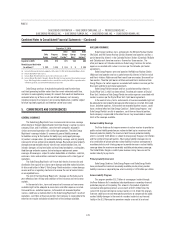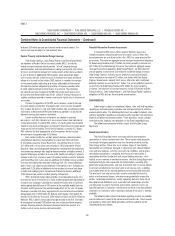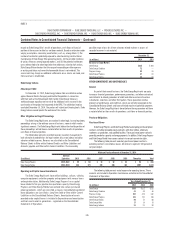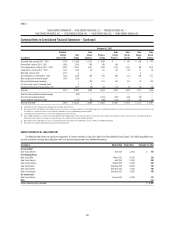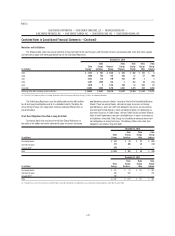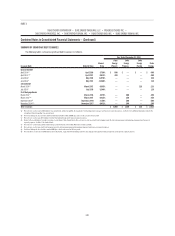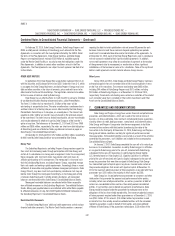Duke Energy 2014 Annual Report Download - page 152
Download and view the complete annual report
Please find page 152 of the 2014 Duke Energy annual report below. You can navigate through the pages in the report by either clicking on the pages listed below, or by using the keyword search tool below to find specific information within the annual report.
132
PART II
DUKE ENERGY CORPORATION • DUKE ENERGY CAROLINAS, LLC • PROGRESS ENERGY, INC. •
DUKE ENERGY PROGRESS, INC. • DUKE ENERGY FLORIDA, INC. • DUKE ENERGY OHIO, INC. • DUKE ENERGY INDIANA, INC.
Combined Notes to Consolidated Financial Statements – (Continued)
criteria for surface impoundments, groundwater monitoring and protection
procedures and other operational and reporting procedures to ensure the safe
disposal and management of CCR. In addition to the requirements of the federal
CCR regulation, CCR landfi lls and surface impoundments will continue to be
independently regulated by most states. Duke Energy records an asset retirement
obligation when it has a legal obligation to incur retirement costs associated
with the retirement of a long-lived asset and the obligation can be reasonably
estimated. Once the rule is effective in 2015, additional asset retirement obligation
amounts will be recorded at the Duke registrants. Cost recovery for future
expenditures will be pursued through the normal ratemaking process with state
utility commissions, which permit recovery of necessary and prudently incurred
costs associated with Duke Energy’s regulated operations. At this time, Duke
Energy is evaluating the CCR regulation and developing cost estimates that will
largely be dependent upon compliance alternatives selected to meet requirements
of the regulations. For further discussion of asset retirement obligations see Note 9.
Litigation
Duke Energy
Ash Basin Shareholder Derivative Litigation
Five shareholder derivative lawsuits have been fi led in Delaware Chancery
Court relating to the release at Dan River and to the management of Duke
Energy’s ash basins. On October 31, 2014, the fi ve lawsuits were consolidated
in a single proceeding titled “In Re Duke Energy Corporation Coal Ash
Derivative Litigation.” On December 2, 2014, plaintiffs fi led a Corrected Verifi ed
Consolidated Shareholder Derivative Complaint (Consolidated Complaint).
The Consolidated Complaint names as defendants several current and
former Duke Energy offi cers and directors (collectively, the “Duke Energy
Defendants”). Duke Energy is named as a nominal defendant.
The Consolidated Complaint alleges the Duke Energy Defendants breached
their fi duciary duties to the company by failing to adequately oversee Duke
Energy’s ash basins and that these breaches of fi duciary duty may have
contributed to the incident at Dan River and continued thereafter. The lawsuit
also asserts claims against the Duke Energy Defendants for corporate waste
(relating to the money Duke Energy has spent and will spend as a result of
the fi nes, penalties, and coal ash removal) and unjust enrichment (relating to
the compensation and director remuneration that was received despite these
alleged breaches of fi duciary duty). The lawsuit seeks both injunctive relief
against Duke Energy and restitution from the Duke Energy Defendants. On
January 21, 2015, the Duke Energy Defendants fi led a Motion to Stay and an
alternative Motion to Dismiss.
On May 28, 2014, Duke Energy received a shareholder litigation demand
letter sent on behalf of shareholder Mitchell Pinsly. The letter alleges that the
members of the Board of Directors and certain offi cers breached their fi duciary
duties by allowing the company to illegally dispose of and store coal ash
pollutants. The letter demands that the Board of Directors take action to recover
damages associated with those breaches of fi duciary duty; otherwise, the
attorney will fi le a shareholder derivative action. By letter dated July 3, 2014,
counsel for the shareholder was informed that the Board of Directors appointed
a Demand Review Committee to evaluate the allegations in the Demand Letter.
It is not possible to predict whether Duke Energy will incur any liability or
to estimate the damages, if any, it might incur in connection with these matters.
Progress Energy Merger Shareholder Litigation
Duke Energy, the eleven members of the Board of Directors who were
also members of the pre-merger Board of Directors (Legacy Duke Energy
Directors) and certain Duke Energy offi cers are defendants in a purported
securities class action lawsuit (Nieman v. Duke Energy Corporation, et al). This
lawsuit consolidates three lawsuits originally fi led in July 2012, and is pending
in the United States District Court for the Western District of North Carolina.
The plaintiffs allege federal Securities Act and Exchange Act claims based on
allegations of materially false and misleading representations and omissions in
the Registration Statement fi led on July 7, 2011, and purportedly incorporated
into other documents, all in connection with the post-merger change in Chief
Executive Offi cer (CEO). On August 15, 2014, the parties reached an agreement
in principle to settle the litigation for an amount which, net of the expected
proceeds of insurance policies, is not anticipated to have a material effect on
the results of operations, cash fl ows or fi nancial position of Duke Energy. On
December 2, 2014, the parties executed a Memorandum of Understanding
relating to the settlement which will be submitted to the court for approval.
On May 31, 2013, the Delaware Chancery Court consolidated four
shareholder derivative lawsuits fi led in 2012. The Court also appointed a lead
plaintiff and counsel for plaintiffs and designated the case as In Re Duke Energy
Corporation Derivative Litigation. The lawsuit names as defendants the Legacy
Duke Energy Directors. Duke Energy is named as a nominal defendant. The case
alleges claims for breach of fi duciary duties of loyalty and care in connection
with the post-merger change in CEO. The case is stayed pending resolution of
the Nieman v. Duke Energy Corporation, et al. case in North Carolina.
Two shareholder Derivative Complaints, fi led in 2012 in federal district
court in Delaware, were consolidated as Tansey v. Rogers, et al. The case
alleges claims for breach of fi duciary duty and waste of corporate assets, as
well as claims under Section 14(a) and 20(a) of the Exchange Act. Duke Energy
is named as a nominal defendant. Pursuant to an Order entered on September
2, 2014, the court administratively closed this consolidated derivative action.
The parties fi led a status report with the court on December 1, 2014, and will
continue to do so every six months thereafter until the Nieman v. Duke Energy
Corporation, et al. case in North Carolina has been resolved.
On August 3, 2012, Duke Energy was served with a shareholder Derivative
Complaint, which was transferred to the North Carolina Business Court (Krieger
v. Johnson, et al.). The lawsuit names as defendants William D. Johnson and the
Legacy Duke Energy Directors. Duke Energy is named as a nominal defendant.
The lawsuit alleges claims for breach of fi duciary duty in granting excessive
compensation to Mr. Johnson. On April 30, 2014, the North Carolina Business
Court granted the Legacy Duke Energy Directors’ motion to dismiss the lawsuit.
It is not possible to estimate the maximum exposure of loss that may
occur in connection with these lawsuits.
Price Reporting Cases
A total of fi ve lawsuits were fi led against Duke Energy affi liates and
other energy companies and remain pending in a consolidated, single federal
court proceeding in Nevada. Each of these lawsuits contain similar claims
that defendants allegedly manipulated natural gas markets by various means,
including providing false information to natural gas trade publications and
entering into unlawful arrangements and agreements in violation of the antitrust
laws of the respective states. Plaintiffs seek damages in unspecifi ed amounts.
On July 18, 2011, the judge granted a defendant’s motion for summary
judgment in two of the remaining fi ve cases to which Duke Energy affi liates are
a party. The U.S. Court of Appeals for the Ninth Circuit subsequently reversed
the lower court’s decision. On July 1, 2014, the U.S. Supreme Court granted the
defendants’, including Duke Energy, petition for certiorari. Oral argument was
held on January 12, 2015.
It is not possible to predict whether Duke Energy will incur any liability or
to estimate the damages, if any, it might incur in connection with the remaining







